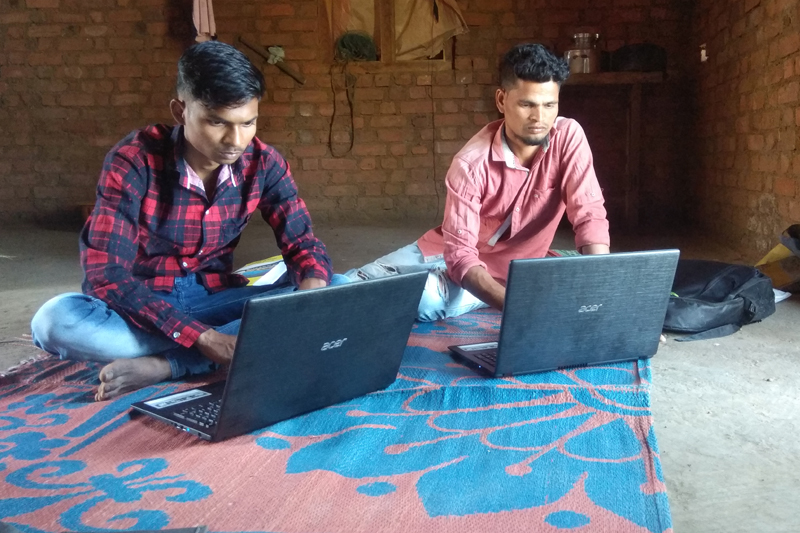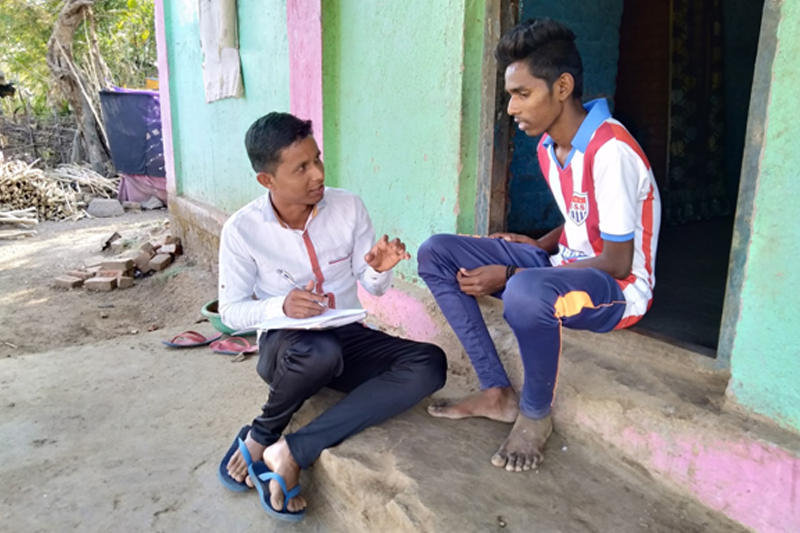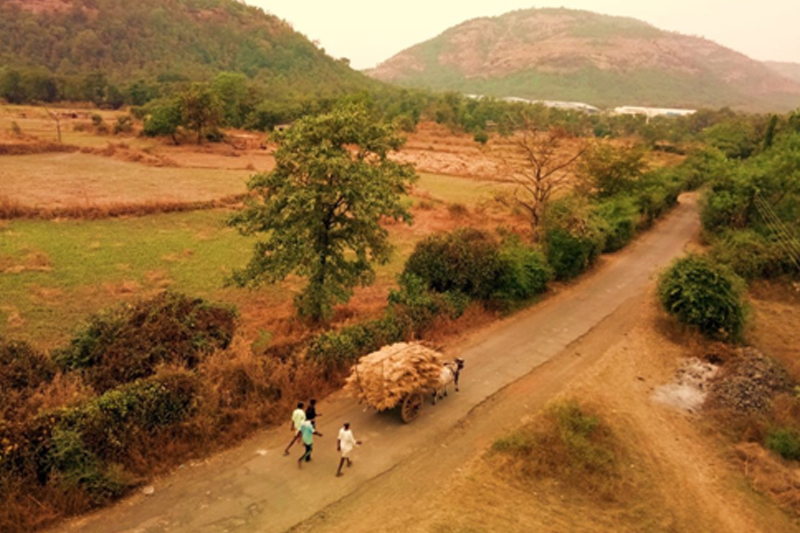Strengthening Local Democracy

Partner: Azim Premji Philanthropic Initiative
Key Words:
73rd Amendment, Local Democracy, Last Mile Governance and E-Governance (Digital Literacy), Women’s leadership through SHG, livelihood
Context:
In the current information age, Internet, with its enabling, facilitating and wealth creating potential, it has become a powerful enabler to enhance the quality of life by brining equity in many spheres. The key barriers to digital inclusion are lack of affordable access , poor quality or absent last mile infrastructure, lack of digital literacy, and lack of awareness about the benefits of internet access. Many poor tribal of India are landless laborers and daily wage earners who end up taking time off from their daily work in order to visit taluka places to acquire certificates or schemes.
The execution of 73rd Amendment demands participation of villagers in Gramsabha. This forum is a powerful platform for the villagers to bring their concerns to the attention of the Grampanchayat members for improved governance and also keeping checks and balances on the policies and expenditure of the Gramsabha. Our past experiences have informed us that women stay out of all these democratic processes due to lack of agency and knowledge.
Concept:
Improving Tribal lives in 18 villages (12 Grampanchayats - GP) in tribal district of Maharashtra called Palghar through model of E-Sevaks who would use advocacy and education as tools for capacity building of the villagers. They would provide various E-Governance services through 14 computer kiosks (Stationary & Mobile) set as E-Seva Kendra. This would lead to abolishing trips to Taluka for accessing various government services for the villagers and would save person days and money of the villagers.
Strengthening local democracy through increased participation of villagers from 18 villages (12 grampanchayats) in their Gramsabhas that take place 4 times a year. Making villagers aware of their power and potential to change the dialogue in their favor by bringing issues of their concern to Gramsabha. This would be done by awareness campaigns conducted by E-Sevaks and E-Sevaks attending the Gramsabhas themselves. In addition 500 SHG women members of 18 villages would be trained in ICT, E-Governance and Governance and would be encouraged to organize women's meetings before Gramsabha.
SHG women members would be expected to raise questions related to improving the efficiency of implementations and disbursement of funds for villages towards essential services like health sanitation and education. This would also help in creating ecosystem for gender equity.
Rendering E-Governance to villagers from 200 villages that are outside the ambit of the project area by conducting E-Governance camps in each of these villages where the E-Sevaks who are the members of the newly formed cooperative would help people access services like Aadhar Card, Pan cards, Voter' registration etc. Thee villages belong to other blocks of Palghar.
PUKAR, through its program “Information for All, E-Governance for All” conducted in 14 tribal villages, effectively showed how conducting digital literacy campaigns including financial inclusion, democratic participation and special schemes, helped rural poor and tribal saved time and money by avoiding trips to taluka places. This took place by villagers visiting kiosks set up by APPI-PUKAR partnership where villagers could access the internet and complete all the formalities on the internet accruing benefits like schemes, loans, scholarships, pensions etc. This particular project is now being scaled up to another 18 villages.
 Objective:
Objective:
 About Palghar
Palghar, a recently minted (August 2014) tribal district in state of Maharashtra is about 120- 140 KMs north of Mumbai city along the Mumbai-Ahmedabad highway. Skirted by Gujrat on the north and northeast and Nasik district of Maharashtra on the west, Palghar is home to landowners belonging to Agri and Kunabi ethnicity (OBC) and tribal (Adivasi)* form the agricultural labour toiling in these lands.
Palghar has 8 blocks which covered 880 villages- 473 Grampanchayas. Total population of Palghar district is 4179553.
Adivasi: Adi means first, Vasi means Inhabitants. Indigenous people, Natives. Each village has separate hamlets for the tribal folks called “Pada” Compared to the rest of the villages, the Adivasi hamlets are poorly developed with absent infrastructure and services. The major industry in addition to agriculture is sand mining from the riverbed. Many youth work in nearby industries as daily wageworkers.
18 villages of Palghar block comprising of 12 Grampanchayats.
Village Names:
Sonave Lalthane Girnoli Sagawe Katale Vasaroli
Vandiwali Wakadi Kharshe Ambhan Bandhan Khaire
Savarkhand Kosbad Durves, Saye, Bot Vehloli
Time Span: 3 Years -October 2018- Sept 2021
Change Agents: E-Sevaks
Concept of E-Sevaks:
PUKAR has innovated the concept of E-Sevaks based upon PUKAR’s 10 year old, globally validated concept of Barefoot Researchers.
This concept basically involves Community Based Participatory Action Research (CBPAR) conducted by the community based youth who are trained in conducting research on their community including needs assessments, analyze the results and based upon the evidence found, implement an action that bring about the change in their community. Drawing upon Professor Arjun Appadurai’s essay “Right To Research”, anchored in the principle of ‘experiential learning’, this concept uses CBPAR as a tool for alternative pedagogy, advocacy for and interventions in the community and transformations. This approach enables youth to become leaders and change-makers in their communities. PUKAR’s past experience has informed us that this unique process of knowledge creation through multiple epistemologies and community-based action-research from the lens of the youth has a strong transformative power for social change in the youth, their families, and communities. The youth become critical thinkers, conscious and assertive citizens and leaders of their communities, thus enhancing the quality of life for themselves and their cities.
About Palghar
Palghar, a recently minted (August 2014) tribal district in state of Maharashtra is about 120- 140 KMs north of Mumbai city along the Mumbai-Ahmedabad highway. Skirted by Gujrat on the north and northeast and Nasik district of Maharashtra on the west, Palghar is home to landowners belonging to Agri and Kunabi ethnicity (OBC) and tribal (Adivasi)* form the agricultural labour toiling in these lands.
Palghar has 8 blocks which covered 880 villages- 473 Grampanchayas. Total population of Palghar district is 4179553.
Adivasi: Adi means first, Vasi means Inhabitants. Indigenous people, Natives. Each village has separate hamlets for the tribal folks called “Pada” Compared to the rest of the villages, the Adivasi hamlets are poorly developed with absent infrastructure and services. The major industry in addition to agriculture is sand mining from the riverbed. Many youth work in nearby industries as daily wageworkers.
18 villages of Palghar block comprising of 12 Grampanchayats.
Village Names:
Sonave Lalthane Girnoli Sagawe Katale Vasaroli
Vandiwali Wakadi Kharshe Ambhan Bandhan Khaire
Savarkhand Kosbad Durves, Saye, Bot Vehloli
Time Span: 3 Years -October 2018- Sept 2021
Change Agents: E-Sevaks
Concept of E-Sevaks:
PUKAR has innovated the concept of E-Sevaks based upon PUKAR’s 10 year old, globally validated concept of Barefoot Researchers.
This concept basically involves Community Based Participatory Action Research (CBPAR) conducted by the community based youth who are trained in conducting research on their community including needs assessments, analyze the results and based upon the evidence found, implement an action that bring about the change in their community. Drawing upon Professor Arjun Appadurai’s essay “Right To Research”, anchored in the principle of ‘experiential learning’, this concept uses CBPAR as a tool for alternative pedagogy, advocacy for and interventions in the community and transformations. This approach enables youth to become leaders and change-makers in their communities. PUKAR’s past experience has informed us that this unique process of knowledge creation through multiple epistemologies and community-based action-research from the lens of the youth has a strong transformative power for social change in the youth, their families, and communities. The youth become critical thinkers, conscious and assertive citizens and leaders of their communities, thus enhancing the quality of life for themselves and their cities.
 Objective:
Objective:
- Create a cadre of local youth who would be empowered with thorough knowledge of the governance system of their Grampanchayat, of Sustainable Development Goals (SDGs) and other developmental paradigms, execution of various schemes like PESA, and electoral processes. This, hopefully would lead to more of the youth with proper knowledge and capabilities, participating in the local electoral processes and bringing their knowledge and skills to the Grampanchayat.
- Make every household from 18 villages aware of the functioning of the
- Create demands from the villagers for their rights, and for accountable and transparent governing systems, right kind of service deliveries on time.
- Create Women’s leadership by working with Self Help Groups of women in 60 villages in order to empower them to become active, and demanding citizens and participants in the function of their local Grampanchayat. This would lead to better service delivery and use of relevant rules, regulations and power levers within the Panchayat structure in a disbursement of local funds to critical areas.
- Creating livelihood options for the Local youth by acquiring licenses, Village Level Entrepreneurship.
 About Palghar
Palghar, a recently minted (August 2014) tribal district in state of Maharashtra is about 120- 140 KMs north of Mumbai city along the Mumbai-Ahmedabad highway. Skirted by Gujrat on the north and northeast and Nasik district of Maharashtra on the west, Palghar is home to landowners belonging to Agri and Kunabi ethnicity (OBC) and tribal (Adivasi)* form the agricultural labour toiling in these lands.
Palghar has 8 blocks which covered 880 villages- 473 Grampanchayas. Total population of Palghar district is 4179553.
Adivasi: Adi means first, Vasi means Inhabitants. Indigenous people, Natives. Each village has separate hamlets for the tribal folks called “Pada” Compared to the rest of the villages, the Adivasi hamlets are poorly developed with absent infrastructure and services. The major industry in addition to agriculture is sand mining from the riverbed. Many youth work in nearby industries as daily wageworkers.
18 villages of Palghar block comprising of 12 Grampanchayats.
Village Names:
Sonave Lalthane Girnoli Sagawe Katale Vasaroli
Vandiwali Wakadi Kharshe Ambhan Bandhan Khaire
Savarkhand Kosbad Durves, Saye, Bot Vehloli
Time Span: 3 Years -October 2018- Sept 2021
Change Agents: E-Sevaks
Concept of E-Sevaks:
PUKAR has innovated the concept of E-Sevaks based upon PUKAR’s 10 year old, globally validated concept of Barefoot Researchers.
This concept basically involves Community Based Participatory Action Research (CBPAR) conducted by the community based youth who are trained in conducting research on their community including needs assessments, analyze the results and based upon the evidence found, implement an action that bring about the change in their community. Drawing upon Professor Arjun Appadurai’s essay “Right To Research”, anchored in the principle of ‘experiential learning’, this concept uses CBPAR as a tool for alternative pedagogy, advocacy for and interventions in the community and transformations. This approach enables youth to become leaders and change-makers in their communities. PUKAR’s past experience has informed us that this unique process of knowledge creation through multiple epistemologies and community-based action-research from the lens of the youth has a strong transformative power for social change in the youth, their families, and communities. The youth become critical thinkers, conscious and assertive citizens and leaders of their communities, thus enhancing the quality of life for themselves and their cities.
About Palghar
Palghar, a recently minted (August 2014) tribal district in state of Maharashtra is about 120- 140 KMs north of Mumbai city along the Mumbai-Ahmedabad highway. Skirted by Gujrat on the north and northeast and Nasik district of Maharashtra on the west, Palghar is home to landowners belonging to Agri and Kunabi ethnicity (OBC) and tribal (Adivasi)* form the agricultural labour toiling in these lands.
Palghar has 8 blocks which covered 880 villages- 473 Grampanchayas. Total population of Palghar district is 4179553.
Adivasi: Adi means first, Vasi means Inhabitants. Indigenous people, Natives. Each village has separate hamlets for the tribal folks called “Pada” Compared to the rest of the villages, the Adivasi hamlets are poorly developed with absent infrastructure and services. The major industry in addition to agriculture is sand mining from the riverbed. Many youth work in nearby industries as daily wageworkers.
18 villages of Palghar block comprising of 12 Grampanchayats.
Village Names:
Sonave Lalthane Girnoli Sagawe Katale Vasaroli
Vandiwali Wakadi Kharshe Ambhan Bandhan Khaire
Savarkhand Kosbad Durves, Saye, Bot Vehloli
Time Span: 3 Years -October 2018- Sept 2021
Change Agents: E-Sevaks
Concept of E-Sevaks:
PUKAR has innovated the concept of E-Sevaks based upon PUKAR’s 10 year old, globally validated concept of Barefoot Researchers.
This concept basically involves Community Based Participatory Action Research (CBPAR) conducted by the community based youth who are trained in conducting research on their community including needs assessments, analyze the results and based upon the evidence found, implement an action that bring about the change in their community. Drawing upon Professor Arjun Appadurai’s essay “Right To Research”, anchored in the principle of ‘experiential learning’, this concept uses CBPAR as a tool for alternative pedagogy, advocacy for and interventions in the community and transformations. This approach enables youth to become leaders and change-makers in their communities. PUKAR’s past experience has informed us that this unique process of knowledge creation through multiple epistemologies and community-based action-research from the lens of the youth has a strong transformative power for social change in the youth, their families, and communities. The youth become critical thinkers, conscious and assertive citizens and leaders of their communities, thus enhancing the quality of life for themselves and their cities.

